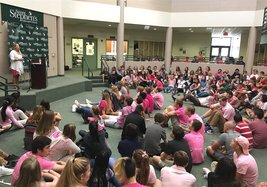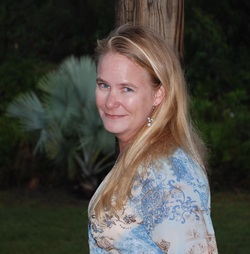
I recently spent the day at the St. Stephen’s Episcopal School in Bradenton, and had the opportunity to talk to both the middle school and upper school about 9/11, as well as eat lunch with the book club. I was impressed by every single student I encountered at SSES, and feel honored to have been invited. (Thank you, Ms. Pommer!) It was a thought-provoking day, and I couldn’t have asked for a better audience.

I also had the pleasure of speaking to Mr. Hoonhout’s creative writing class about the importance of voice in our writing, and wanted to talk about some of the things I have been thinking about.
To an author a voice means a lot of things, but mainly it is what you hear when an editor or reader likes your work (What an unusual, fresh voice!”) or doesn’t (“The voice just didn’t resonate with me.”). Every published author has heard some variation of this over the years, hopefully the former, because that’s what gets you published. :)
The question is, what is voice?
The first thing we need to do is separate author voice from character voice.
Character voice is how your character sounds, which is imbued from their history, their experiences– who they are. In any given story, you as an author are going to be asked to show many different character voices, and you must know the character to do this: their goals, their heartbreaks, their fateful decisions. Every single sentence should show your reader who that person is.
You can tell a LOT about a character in just one sentence. For example, your character comes up to their locker and there is someone standing in front of it:
A mean person might shoulder the other person out of the way and say, “Hey, loser get out of my way.”
A shy person might say nothing and wait for the other person to leave.
An outgoing person might say, “Since you’re standing there, hold my backpack, will you? Aren’t you in my biology class?”
How your characters react is telling. Who they are shines through in even this simple interaction.
You need to know who your character is inside and out to be able to do this successfully. When I wrote All We Have Left, I switched between two girls point of view, and it was a challenge to understand who these girls were, and how they were different, as well as how they were the same. Jesse was dark and sarcastic and sometimes shy; Alia was optimistic, breezy and feisty. How they approached the world was completely different, colored by their experiences. Every sentence that came out of their mouths, every scene they narrated, had to reflect the person they were. What’s more, I had to know why they were like that: their life experiences, their hopes, their dreams, their crushing failures. As a writer, we always know way more about our characters than what makes it onto paper. The reader is only seeing the shining, jagged iceberg, with just hints of what lies below the surface.
Now that we understand a little better what character voice is, we need to look at author voice.
Author voice is much more difficult to define. In some ways, it’s like telling a blind person what the sky looks like. Every one of us would approach this in a different way, because we all have our own unique way of looking at the world.
Your voice isn’t one in a million, it’s one in a billion. It’s who you are when you’re talking to your best friend, it’s the realness of writing a letter to your future self, it’s the stuff that you think but never actually say. It’s your utterly unique way of looking at the world, and no one else can look at it quite the same way because no one else has had the life story that you have.
To write in your own voice you have to be brave. You have to care deeply about what you’re writing. You have to be you.
If all this sounds like you have to know yourself pretty well before you find your voice, then I have done my job. Because your author voice is exactly, solely you, and you have to dig for it. You have to unearth it, polish it up, and watch how it sparkles. It’s not easy, and it’s not for the faint-hearted, but when you find it… ah.
Finding your own voice isn’t something you learn. It’s not something you search for in a thousand books. It’s the moment you realize that as well as an author said something, it’s not the way you would have said it.
Do you have any examples of how voice places a role in your own work?
I have asked Mr. Hoonhout’s class to chime in on this, and I look forward to seeing some of the example of the exercises they have been working on.
To an author a voice means a lot of things, but mainly it is what you hear when an editor or reader likes your work (What an unusual, fresh voice!”) or doesn’t (“The voice just didn’t resonate with me.”). Every published author has heard some variation of this over the years, hopefully the former, because that’s what gets you published. :)
The question is, what is voice?
The first thing we need to do is separate author voice from character voice.
Character voice is how your character sounds, which is imbued from their history, their experiences– who they are. In any given story, you as an author are going to be asked to show many different character voices, and you must know the character to do this: their goals, their heartbreaks, their fateful decisions. Every single sentence should show your reader who that person is.
You can tell a LOT about a character in just one sentence. For example, your character comes up to their locker and there is someone standing in front of it:
A mean person might shoulder the other person out of the way and say, “Hey, loser get out of my way.”
A shy person might say nothing and wait for the other person to leave.
An outgoing person might say, “Since you’re standing there, hold my backpack, will you? Aren’t you in my biology class?”
How your characters react is telling. Who they are shines through in even this simple interaction.
You need to know who your character is inside and out to be able to do this successfully. When I wrote All We Have Left, I switched between two girls point of view, and it was a challenge to understand who these girls were, and how they were different, as well as how they were the same. Jesse was dark and sarcastic and sometimes shy; Alia was optimistic, breezy and feisty. How they approached the world was completely different, colored by their experiences. Every sentence that came out of their mouths, every scene they narrated, had to reflect the person they were. What’s more, I had to know why they were like that: their life experiences, their hopes, their dreams, their crushing failures. As a writer, we always know way more about our characters than what makes it onto paper. The reader is only seeing the shining, jagged iceberg, with just hints of what lies below the surface.
Now that we understand a little better what character voice is, we need to look at author voice.
Author voice is much more difficult to define. In some ways, it’s like telling a blind person what the sky looks like. Every one of us would approach this in a different way, because we all have our own unique way of looking at the world.
Your voice isn’t one in a million, it’s one in a billion. It’s who you are when you’re talking to your best friend, it’s the realness of writing a letter to your future self, it’s the stuff that you think but never actually say. It’s your utterly unique way of looking at the world, and no one else can look at it quite the same way because no one else has had the life story that you have.
To write in your own voice you have to be brave. You have to care deeply about what you’re writing. You have to be you.
If all this sounds like you have to know yourself pretty well before you find your voice, then I have done my job. Because your author voice is exactly, solely you, and you have to dig for it. You have to unearth it, polish it up, and watch how it sparkles. It’s not easy, and it’s not for the faint-hearted, but when you find it… ah.
Finding your own voice isn’t something you learn. It’s not something you search for in a thousand books. It’s the moment you realize that as well as an author said something, it’s not the way you would have said it.
Do you have any examples of how voice places a role in your own work?
I have asked Mr. Hoonhout’s class to chime in on this, and I look forward to seeing some of the example of the exercises they have been working on.

 RSS Feed
RSS Feed